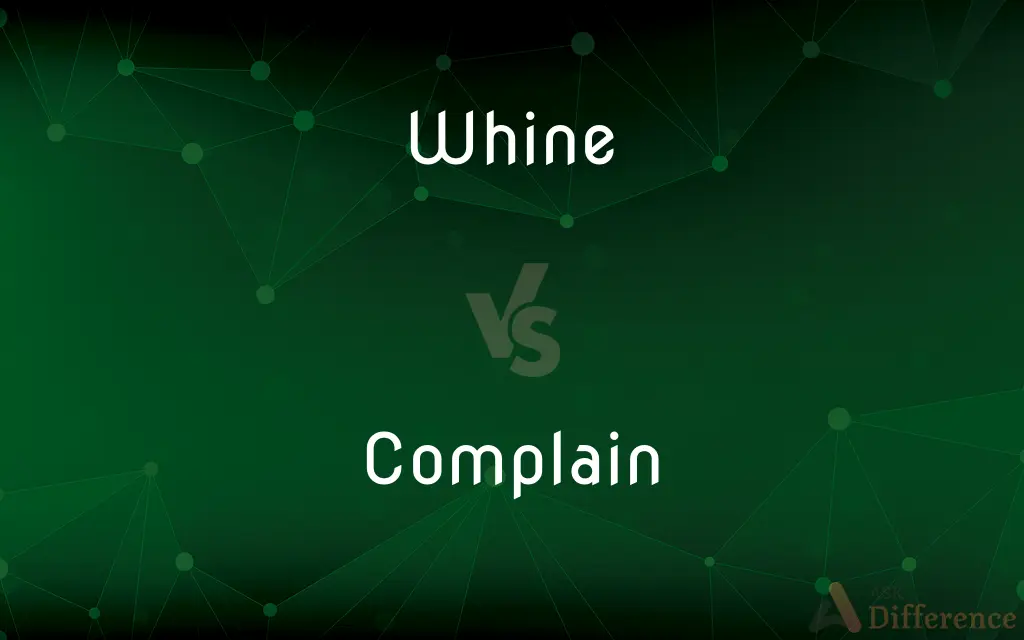Whine vs. Complain — What's the Difference?
By Maham Liaqat & Fiza Rafique — Updated on April 17, 2024
Whining is often a high-pitched, persistent sound expressing discomfort or unhappiness, while complaining involves articulating dissatisfaction or a problem more directly and clearly.

Difference Between Whine and Complain
Table of Contents
ADVERTISEMENT
Key Differences
Whining is characterized by its nagging, often high-pitched tone, which is typically used to express emotional discomfort or minor grievances, especially among children. Complaining, on the other hand, usually involves a clearer and more articulate expression of dissatisfaction or issues, and is commonly used in adult communication to address more significant concerns.
Whining can be perceived as less constructive because it often lacks specific details about the problem and focuses more on the emotional state of the person. In contrast, complaining is generally more accepted as a means of communication because it often includes specific information about the issue at hand and can lead to problem resolution.
In social contexts, whining is usually less tolerated among adults as it is viewed as childish and unproductive. Conversely, complaining can be part of effective communication strategies in both personal and professional environments, provided it is done respectfully and with the intent of seeking solutions.
The response to whining is often one of irritation or dismissiveness, as it can be grating and is perceived as ineffective in problem-solving. Complaints, however, are more likely to elicit a constructive response, as they typically call for an examination of the issue and a potential resolution.
In terms of purpose, whining may serve to seek attention or sympathy without a clear objective towards solving an issue. Complaints are more goal-oriented, aiming at change or improvement regarding a specific dissatisfaction or problem.
ADVERTISEMENT
Comparison Chart
Tone
High-pitched, nagging
Direct, clear
Typical Users
Often children
Adults
Perception
Viewed as childish, less constructive
Accepted as part of effective communication
Response Invoked
Irritation, dismissiveness
Constructive, problem-solving oriented
Purpose
Seeks attention or sympathy
Aims at change or resolution of an issue
Compare with Definitions
Whine
Expressing discomfort or unhappiness with a high-pitched, nagging sound.
The child was whining about bedtime.
Complain
Expressing dissatisfaction or annoyance about a state of affairs or an event.
He was complaining about the service at the restaurant.
Whine
A complaint delivered in a whiny, grating manner.
Her whine about the cold weather was constant.
Complain
A statement expressing discontent.
She filed a formal complaint with the company.
Whine
A person who frequently whines.
He was known as a whiner for his persistent complaints.
Complain
A person who complains frequently or professionally.
As a consumer advocate, she was a professional complainer.
Whine
A tone used particularly when one is unhappy or uncomfortable.
His whining tone made his discomfort obvious.
Complain
A complaint aimed at producing a resolution.
Her constructive complaint led to changes in policy.
Whine
A voice that emits a high-pitched, complaining sound.
She spoke in a whiny voice when upset.
Complain
A complaint stated clearly and directly.
His direct complaint was addressed promptly.
Whine
A long, high-pitched complaining cry
The dog gave a small whine
Complain
To express feelings of pain, dissatisfaction, or resentment.
Whine
Give or make a long, high-pitched complaining cry or sound
The dog whined and scratched at the back door
Complain
To make a formal accusation or bring a formal charge; file a complaint.
Whine
To produce a sustained, high-pitched, plaintive sound, as in pain, fear, or complaint.
Complain
(intransitive) To express feelings of pain, dissatisfaction, or resentment.
Joe was always complaining about the noise made by his neighbours.
Whine
To complain or protest in a childish or annoying fashion
Fans who are always whining about the poor officiating.
Complain
(intransitive) To make a formal accusation or bring a formal charge.
They've complained about me to the police again.
Whine
To produce a sustained noise of high pitch
Jet engines whining.
Complain
To creak or squeak, as a timber or wheel.
The complaining bed-springs
Whine
To utter with a whine.
Complain
To give utterance to expression of grief, pain, censure, regret. etc.; to lament; to murmur; to find fault; - commonly used with of. Also, to creak or squeak, as a timber or wheel.
O loss of sight, of thee I most complain!
Whine
The act of whining
The dog's whine for food.
Complain
To make a formal accusation; to make a charge.
Now, Master Shallow, you'll complain of me to the king?
Whine
A whining sound
The whine of the dentist's drill.
Complain
To lament; to bewail.
They might the grievance inwardly complain.
By chaste Lucrece's soul that late complain'dHer wrongs to us.
Whine
A complaint uttered in a sustained, high-pitched tone
Decided to ignore the children's whines.
Complain
Express complaints, discontent, displeasure, or unhappiness;
My mother complains all day
She has a lot to kick about
Whine
A long-drawn, high-pitched complaining cry or sound.
Complain
Make a formal accusation; bring a formal charge;
The plaintiff's lawyer complained that he defendant had physically abused his client
Whine
A complaint or criticism.
I need to have a quick whine about my boss before we start talking about the holiday.
Whine
(intransitive) To utter a high-pitched cry.
Whine
(intransitive) To make a sound resembling such a cry.
The jet engines whined at take off.
Whine
(intransitive) To complain or protest with a whine or as if with a whine.
Whine
(intransitive) To move with a whining sound.
The jet whined into the air.
The wind whined and moaned through the trees.
Whine
(transitive) To utter with the sound of a whine.
The child whined all his complaints.
Kelly Queen was whining that the boss made him put on his tie.
Whine
To utter a plaintive cry, as some animals; to moan with a childish noise; to complain, or to tell of sorrow, distress, or the like, in a plaintive, nasal tone; hence, to complain or to beg in a mean, unmanly way; to moan basely.
The hounds were . . . staying their coming, but with a whining accent, craving liberty.
Dost thou come here to whine?
Whine
To utter or express plaintively, or in a mean, unmanly way; as, to whine out an excuse.
Whine
A plaintive tone; the nasal, childish tone of mean complaint; mean or affected complaint.
Whine
A complaint uttered in a plaintive whining way
Whine
Move with a whining sound;
The bullets were whining past us
Whine
Talk in a tearful manner
Whine
Complain whiningly
Common Curiosities
What is the main emotional tone of whining?
The main emotional tone of whining is one of distress or dissatisfaction expressed in a high-pitched, nagging manner.
How does complaining differ from whining in terms of problem-solving?
Complaining is more likely to include specific details about the issue and aims at resolving the problem, unlike whining.
What are typical responses to complaining?
Responses to complaining can include problem-solving actions, especially if the complaint is presented constructively.
Is whining ever effective in communication?
Whining is generally less effective in adult communication but might draw attention to emotional needs in less direct ways.
Can adults be perceived as whining?
Yes, adults can whine, but it is generally perceived negatively and considered unprofessional or immature.
How can one transition from whining to complaining?
Transitioning involves using a clearer, more direct tone and focusing on articulating specific grievances and desired outcomes.
What is a formal complaint, and how is it used?
A formal complaint is a documented expression of dissatisfaction intended to invoke an official response or action, commonly used in legal or professional contexts.
Why might someone choose to whine rather than complain?
Someone might choose to whine due to habit, emotional distress, or because they feel unsure how to articulate their needs clearly.
What makes a complaint constructive?
A complaint is constructive if it clearly outlines the problem and proposes or invites solutions.
How should one respond to a whiner?
It's best to encourage clear communication and address the underlying issues directly, rather than focusing solely on the tone.
Share Your Discovery

Previous Comparison
Frame vs. Keyframe
Next Comparison
Swordfish vs. TaxonomyAuthor Spotlight
Written by
Maham LiaqatCo-written by
Fiza RafiqueFiza Rafique is a skilled content writer at AskDifference.com, where she meticulously refines and enhances written pieces. Drawing from her vast editorial expertise, Fiza ensures clarity, accuracy, and precision in every article. Passionate about language, she continually seeks to elevate the quality of content for readers worldwide.















































